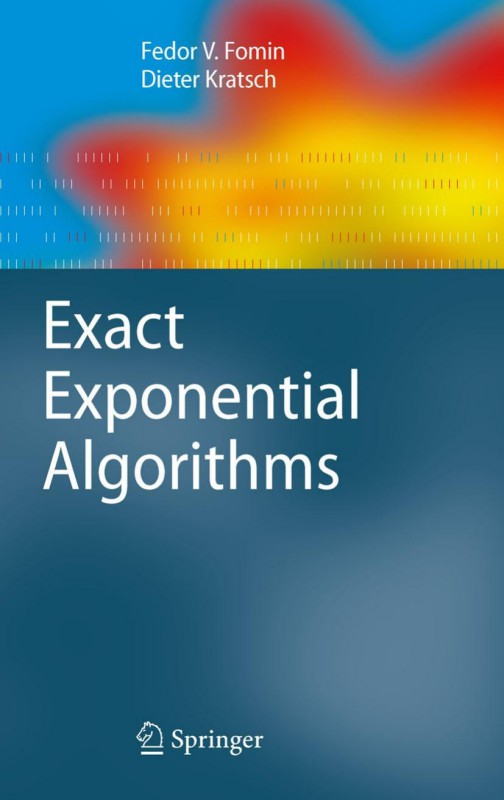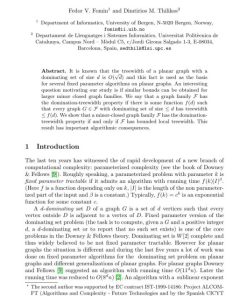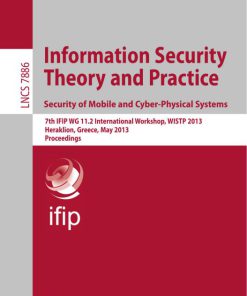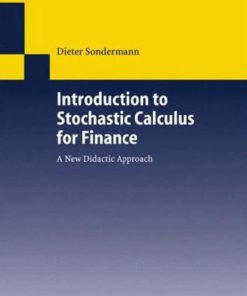Exact Exponential Algorithms 1st Edition by Fedor V Fomin, Dieter Kratsch ISBN 3642165338 9783642165337
$50.00 Original price was: $50.00.$25.00Current price is: $25.00.
Authors:Fedor V. Fomin, Dieter Kratsch , Author sort:Fedor V. Fomin, Dieter Kratsch , Ids:9783642165320 , Languages:Languages:eng
Exact Exponential Algorithms 1st Edition by Fedor V Fomin, Dieter Kratsch – Ebook PDF Instant Download/Delivery. 3642165338, 9783642165337
Full download Exact Exponential Algorithms 1st Edition after payment
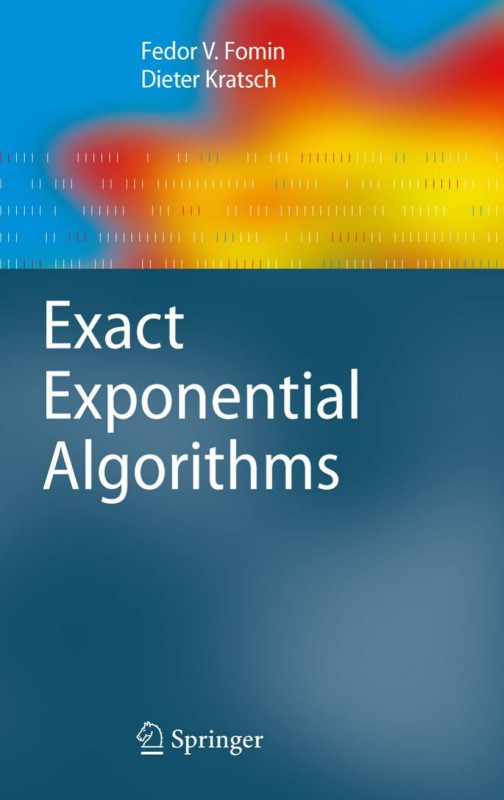
Product details:
ISBN 10: 3642165338
ISBN 13: 9783642165337
Author: Fedor V Fomin, Dieter Kratsch
For a long time computer scientists have distinguished between fast and slow algo rithms. Fast (or good) algorithms are the algorithms that run in polynomial time, which means that the number of steps required for the algorithm to solve a problem is bounded by some polynomial in the length of the input. All other algorithms are slow (or bad). The running time of slow algorithms is usually exponential. This book is about bad algorithms. There are several reasons why we are interested in exponential time algorithms. Most of us believe that there are many natural problems which cannot be solved by polynomial time algorithms. The most famous and oldest family of hard problems is the family of NP complete problems. Most likely there are no polynomial time al gorithms solving these hard problems and in the worst case scenario the exponential running time is unavoidable. Every combinatorial problem is solvable in ?nite time by enumerating all possi ble solutions, i. e. by brute force search. But is brute force search always unavoid able? De?nitely not. Already in the nineteen sixties and seventies it was known that some NP complete problems can be solved signi?cantly faster than by brute force search. Three classic examples are the following algorithms for the TRAVELLING SALESMAN problem, MAXIMUM INDEPENDENT SET, and COLORING.
Exact Exponential Algorithms 1st Table of contents:
1 Introduction
1.1 Preliminaries
1.2 Dynamic Programming for TSP
1.3 A Branching Algorithm for Independent Set
2 Branching
2.1 Fundamentals
2.2 k-Satisfiability
2.3 Independent Set
3 Dynamic Programming
3.1 Basic Examples
3.1.1 Permutation Problems
3.1.2 Partition Problems
3.2 Set Cover and Dominating Set
3.3 TSP on Graphs of Bounded Degree
3.4 Partition into Sets of Bounded Cardinality
4 Inclusion-Exclusion
4.1 The Inclusion-Exclusion Principle
4.2 Some Inclusion-Exclusion Algorithms
4.2.1 Computing the Permanent of a Matrix
4.2.2 Directed Hamiltonian Path
4.2.3 Bin Packing
4.3 Coverings and Partitions
4.3.1 Coverings and Graph Coloring
4.3.2 Partitions
4.3.3 Polynomial Space Algorithms
4.4 Counting Subgraph Isomorphisms
5 Treewidth
5.1 Definition and Dynamic Programming
5.2 Graphs of Maximum Degree 3
5.3 Counting Homomorphisms
5.4 Computing Treewidth
5.4.1 Computing the Treewidth Using Potential Maximal Cliques
5.4.2 Counting Minimal separators and Potential Maximal Cliques
6 Measure & Conquer
6.1 Independent Set
6.2 Feedback Vertex Set
6.2.1 An Algorithm for Feedback Vertex Set
6.2.2 Computing a Minimum Feedback Vertex Set
6.3 Dominating Set
6.3.1 The Algorithm msc
6.3.2 A Measure & Conquer Analysis
6.4 Lower Bounds
7 Subset Convolution
7.1 Fast zeta Transform
7.2 Fast Subset Convolution
7.3 Applications and Variants
7.4 f-width and Rank-width
8 Local Search and SAT
8.1 Random Walks to Satisfying Assignments
8.2 Searching Balls and Cover Codes
9 Split and List
9.1 Sort and Search
9.2 Maximum Cut
10 Time Versus Space
10.1 Space for Time: Divide & Conquer
10.2 Time for Space: Memorization
11 Miscellaneous
11.1 Bandwidth
11.2 Branch & Recharge
11.3 Subexponential Algorithms and ETH
12 Conclusions, Open Problems and Further Directions
People also search for Exact Exponential Algorithms 1st:
exact exponential algorithms
exact exponential algorithms pdf
exact (exponential) algorithms for the dominating set problem
exact algorithm example
exponential algorithm example
You may also like…
eBook PDF
Mastering Windows Server 2016 Hyper V 1st Edition by John Savill ISBN 1119286204 9781119286202
eBook DJVU
Computational Methods of Linear Algebra 1st Edition by V N Faddeeva ISBN 978-0486604244 0486604241

